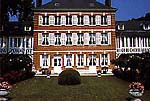Victor Hugo's works are frequently related to the First and Second Empires: on the one hand, they played a major part in forging the epic legend surrounding Napoleon I, and on the other, they were filled with open criticism of the imperial regime created by Napoleon III. Such is the context for any visit to the musée Victor Hugo in Villequier. Indeed, the house in Villequier is linked to a particularly painful event in Hugo's life, for it was here that his daughter Léopoldine and her husband, Charles Vaquerie, drowned in 1843 during when out boating. Hugo, then on holiday in Spain with Juliette Drouet, learned of the terrible accident from a newspaper. He made a pilgrimage to Villequier in 1846 and returned there after his exile from France which lasted the whole of the Second Empire period. This place was to provide inspiration for some of the finest lines in Contemplations, notably:
“Demain, dès l'aube, à l'heure où blanchit la campagne,
je partirai. Vois-tu, je sais que tu m'attends.
J'irai par la forêt, j'irai par la montagne.
Je ne puis demeurer loin de toi plus longtemps.
Je ne regarderai ni l'or du soir qui tombe
Ni les voiles au loin descendant vers Harfleur,
Et quand j'arriverai, je mettrai sur ta tombe
Un bouquet de houx vert et de bruyère en fleur.”
(Tomorrow, at dawn, when the fields are white,
I shall set out. You see, I know you are waiting for me.
I shall go through forests, I shall go over mountains.
I cannot be remain far from you for much longer.
I shall not look at the gold of the falling evening
Nor the sails in the distance heading for Harfleur,
And when I arrive, I shall place on your tomb
A bouquet of green holly and heather in flower.)
What was to become the Vaquerie family residence was transformed in 1951 into a museum in memory of the poet. In addition to a great deal of Hugo family memorabilia it also contains an important collection of Hugo's drawings. In the churchyard in Villequier stand the tombs of Léopoldine, her sister, Adèle, Charles Vaquerie and the poet's wife, “Adèle, femme de Victor Hugo” (Adèle, wife of Victor Hugo).
Musée Victor Hugo


